Knowing about the actions of activated charcoal in neutralising poisons and toxins can prepare you for emergencies and potentially save your pet’s life.
Accidental poisoning in pets is an alarming situation for any pet parent. Dogs and cats are naturally curious and often ingest things they shouldn’t. In the U.S., the ASPCA’s Animal Poison Control Center handles over 200,000 cases annually. In India, while specific statistics are unavailable, veterinary hospitals report poisoning in pets as a common emergency.
Please note – activated charcoal may reduce the chances of the toxin or poison being absorbed into the blood from the stomach, only when given within an hour of consumption. Activated charcoal has proper doses, it doesn’t work against all toxins, and it should never be given to any pet without a veterinarian’s supervision or advice. Activated charcoal is NOT an antidote and it DOES NOT replace proper treatment necessary to reverse the effects of toxins and poisons. You should visit the emergency veterinary clinic near you immediately if you have reason to believe your pet has consumed something toxic or poisonous.
What Is Activated Charcoal for Dogs and Cats?
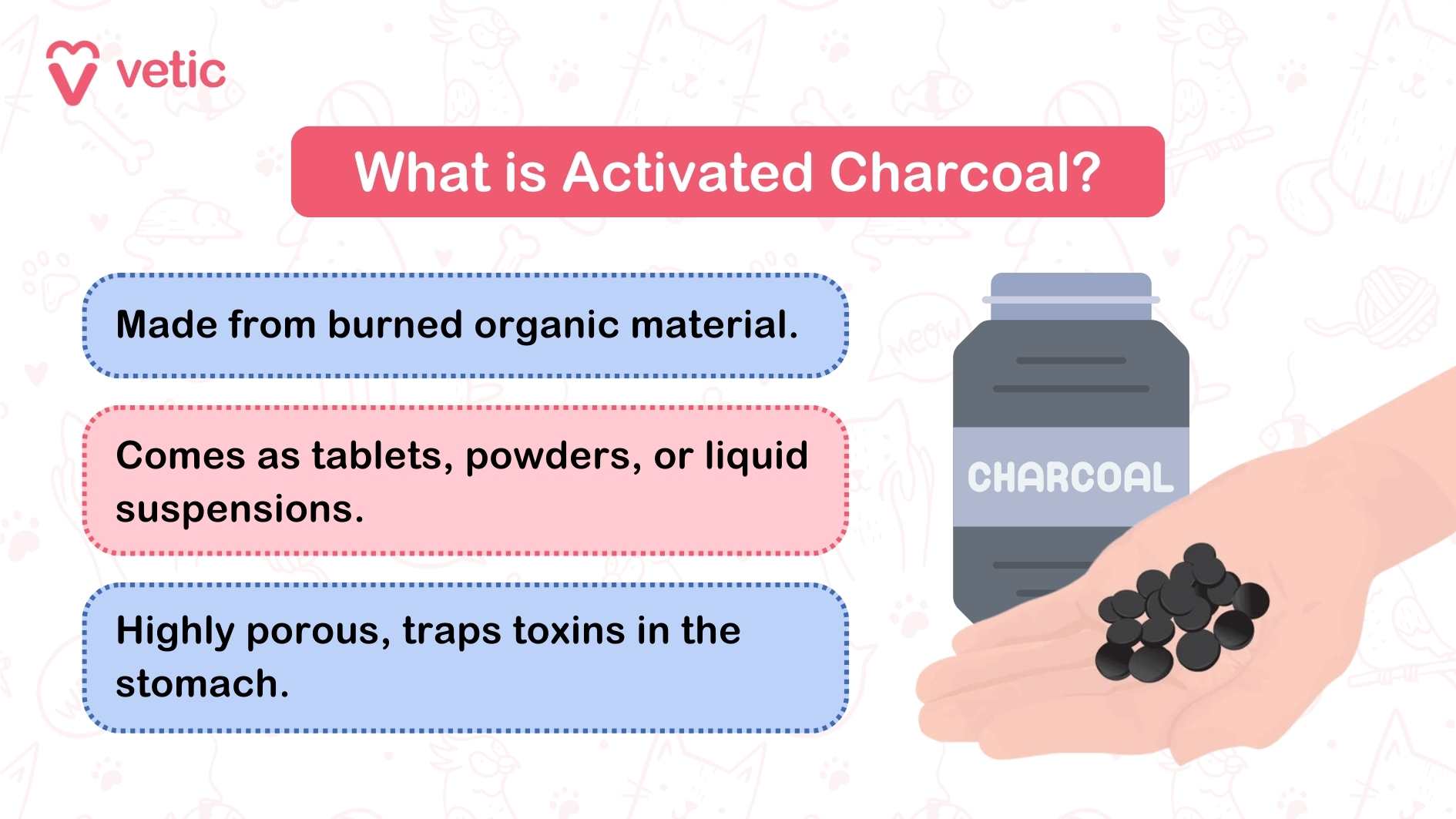
Activated charcoal is a finely processed form of carbon treated to increase its surface area and adsorptive properties. Unlike regular charcoal, activated charcoal can bind to toxins, preventing their absorption into the bloodstream.
In veterinary care, activated charcoal is given to pets orally in these forms:
- Liquid suspension: A mix of activated charcoal with water or another liquid for easy ingestion.
- Paste: A thick, concentrated form often used in clinics.
- Tablets or capsules: These are least effective in veterinary emergencies (encapsulated forms), but easier to store.
When Is Activated Charcoal for Dogs and Cats Effective?
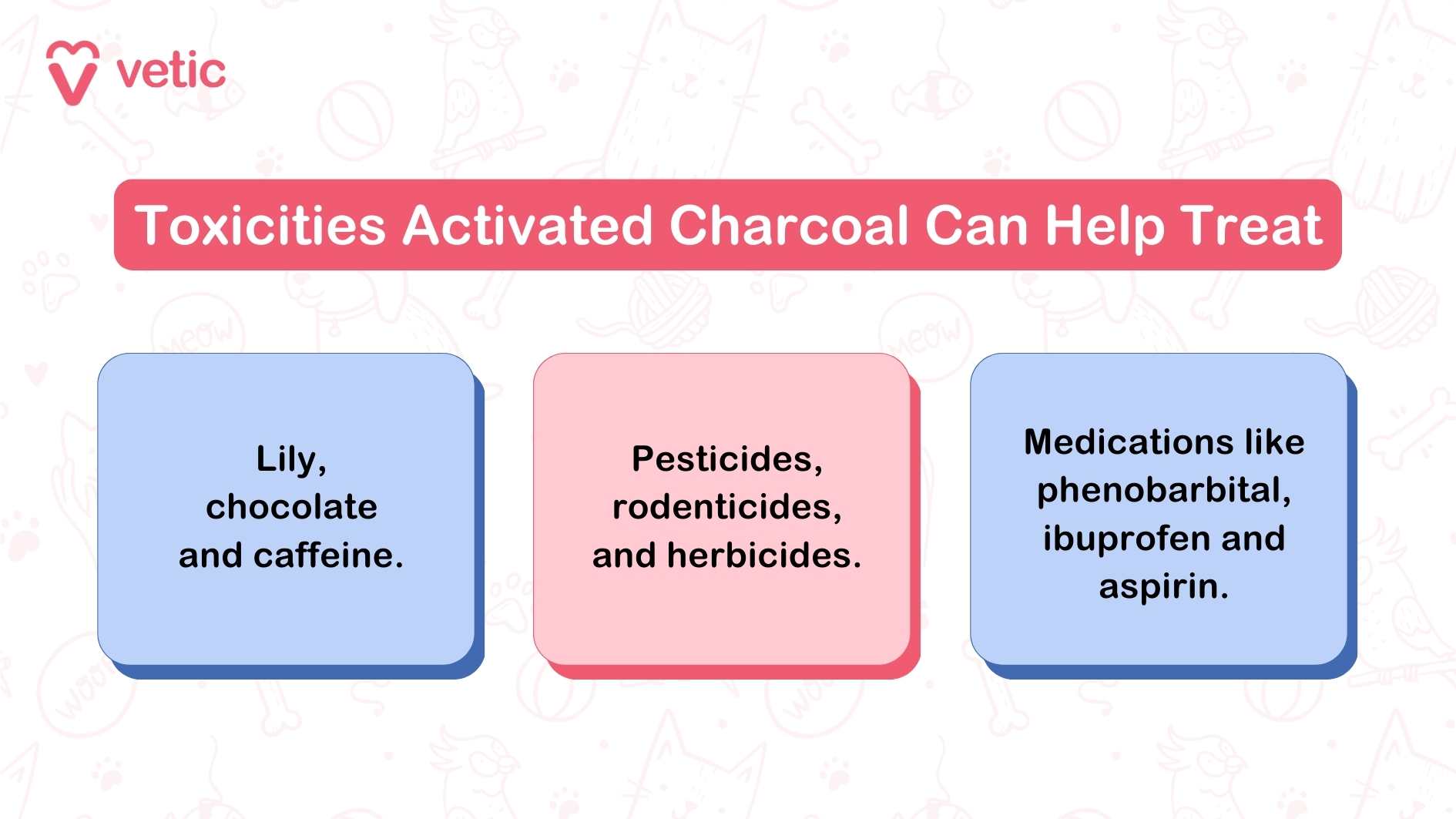
Activated charcoal is effective against many toxins when given shortly after ingestion (ideally within one hour). Some toxins it can neutralize include:
- Over-the-counter medications like ibuprofen, acetaminophen, or aspirin.
- Prescription drugs such as antidepressants, beta-blockers, or sedatives.
- Pesticides like rodenticides.
- Certain plants toxic to pets, such as lilies, philodendrons or dieffenbachia.
Limitations of Activated Charcoal for Dogs and Cats
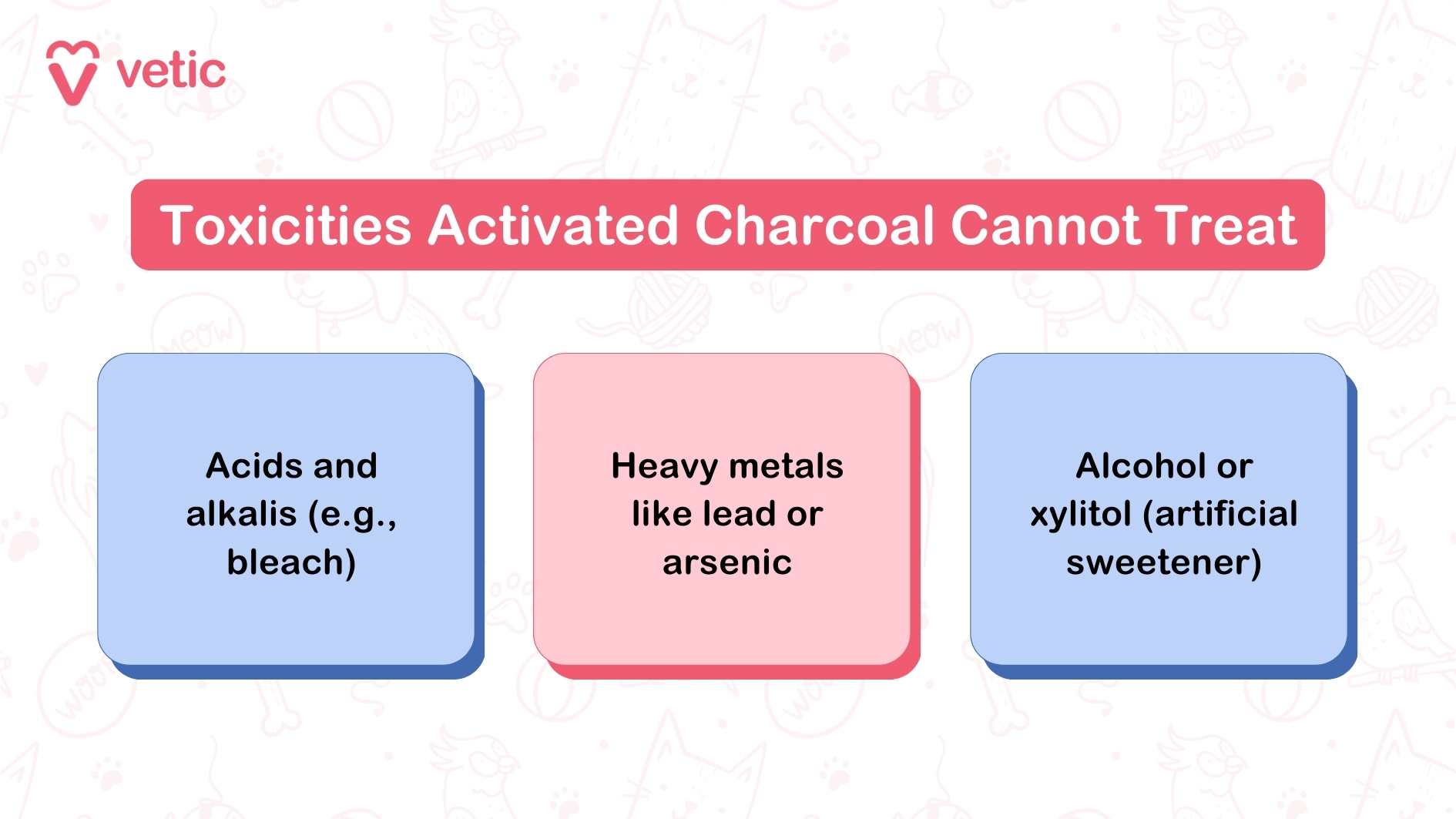
Activated charcoal cannot bind to every toxin. Situations where it’s ineffective include:
- Alcohols like ethanol or methanol
- Heavy metals such as lead, mercury, or arsenic
- Corrosive substances like bleach or battery acid
- Xylitol (a sugar substitute toxic to dogs)
In these cases, other treatments, like induced vomiting, gastric lavage, or IV therapies, may be necessary.
How Does Activated Charcoal for Dogs and Cats Work?
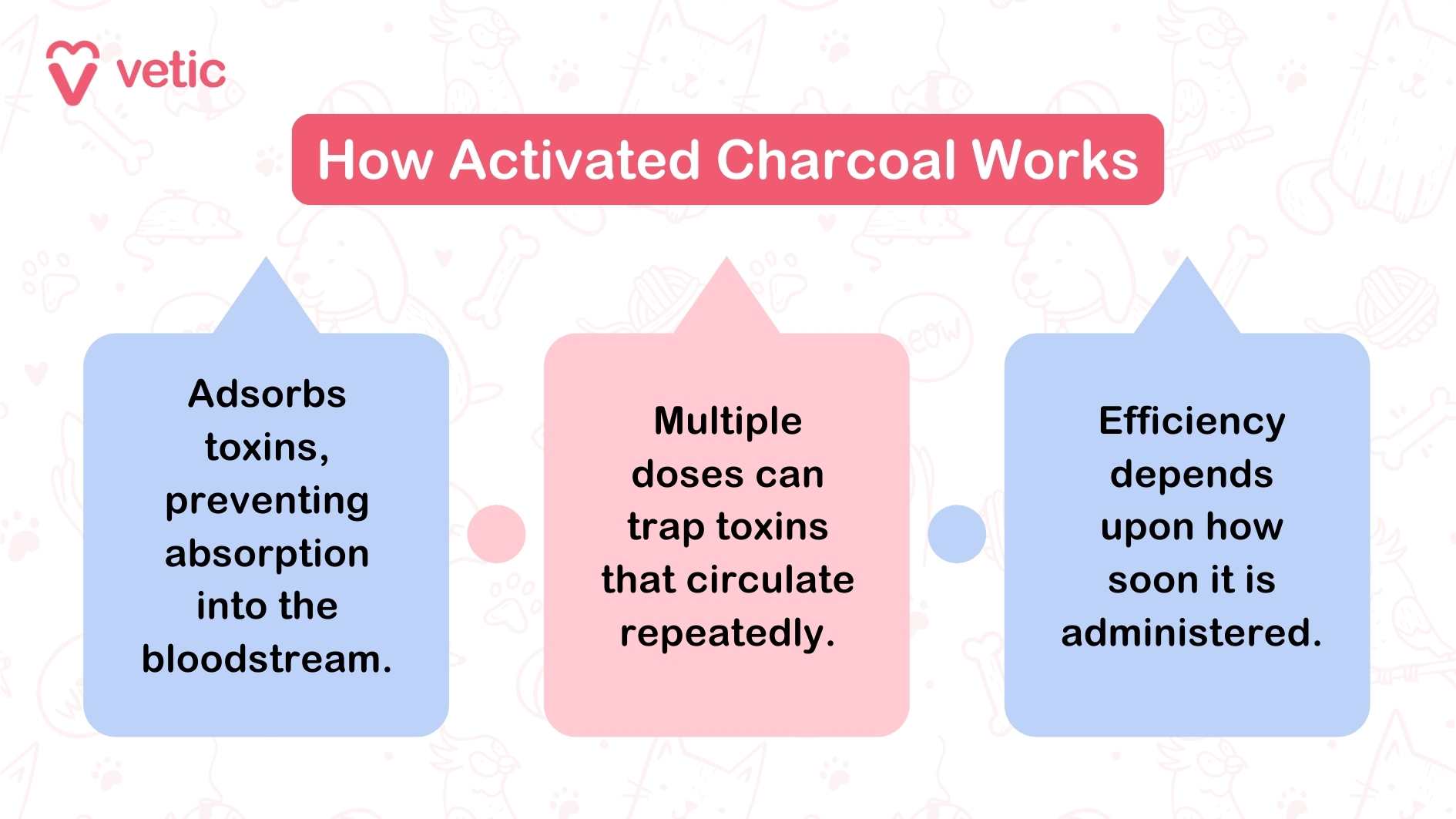
Activated charcoal works by binding (adsorbing) toxins in its porous structure. This prevents the absorption of toxins in the stomach and intestines, and allows the body to excrete them safely through vomiting or feces.
Why are Multiple Doses of Activated Charcoal for Dogs and Cats Needed Sometimes?
For toxins that undergo circulation between the liver and intestine, one dose of activated charcoal isn’t enough.
These toxins are reabsorbed from the intestines into the bloodstream and then excreted into the intestines again – multiple doses are necessary to ensure complete removal.
This is common with substances such as certain pesticides and medications, such as phenobarbital.
Why Should Activated Charcoal for Dogs and Cats Be Administered by a Veterinarian?
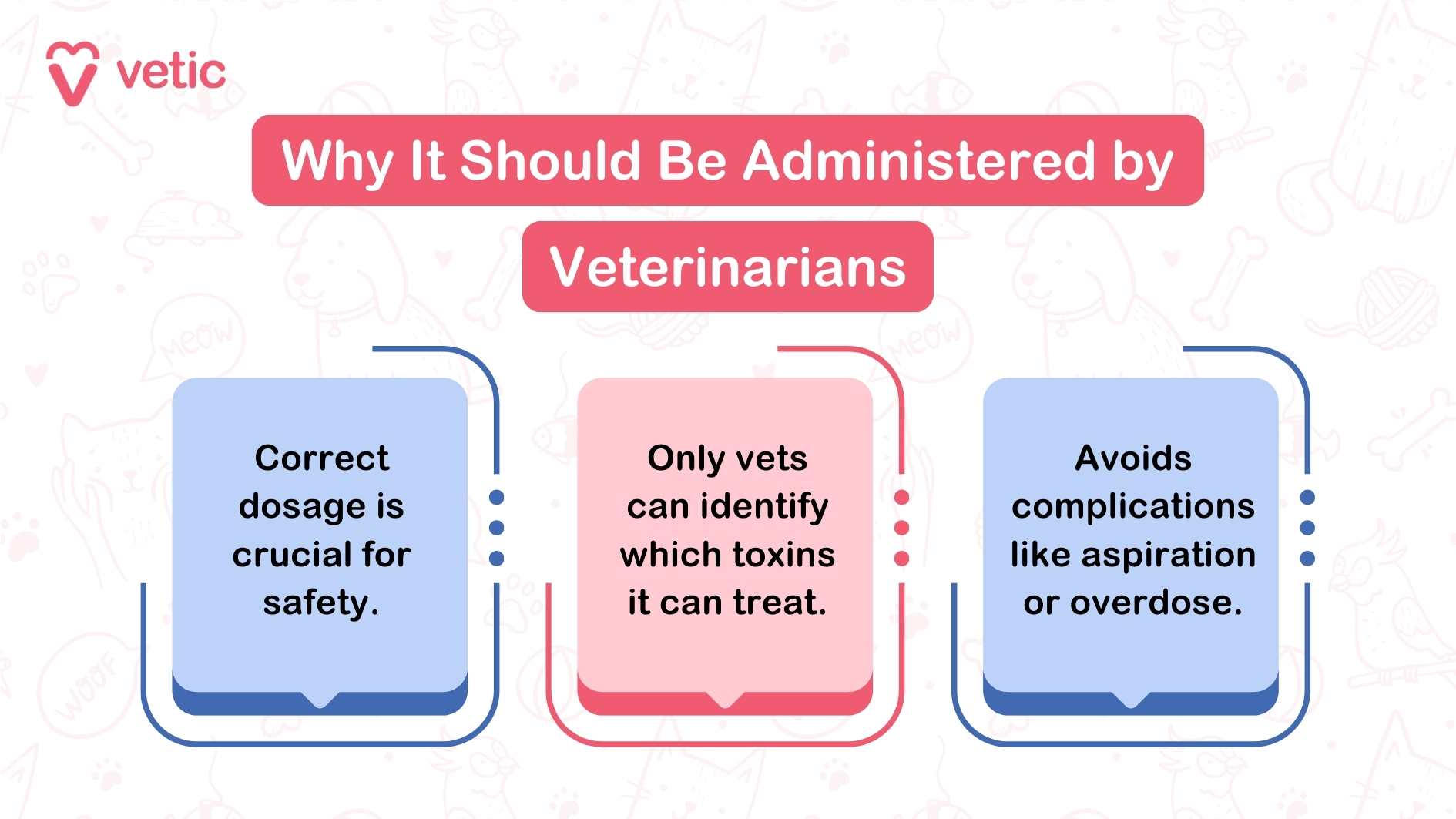
Using activated charcoal without veterinary supervision can be harmful. Veterinarians consider several factors before administration, such as:
- Type of toxin ingested
- Pet’s size and health condition
- Time since ingestion
- Appropriate dosage
Incorrect administration may result in complications or mask symptoms, delaying the correct treatment.
Risks of Using Activated Charcoal for Dogs and Cats Without Veterinary Guidance
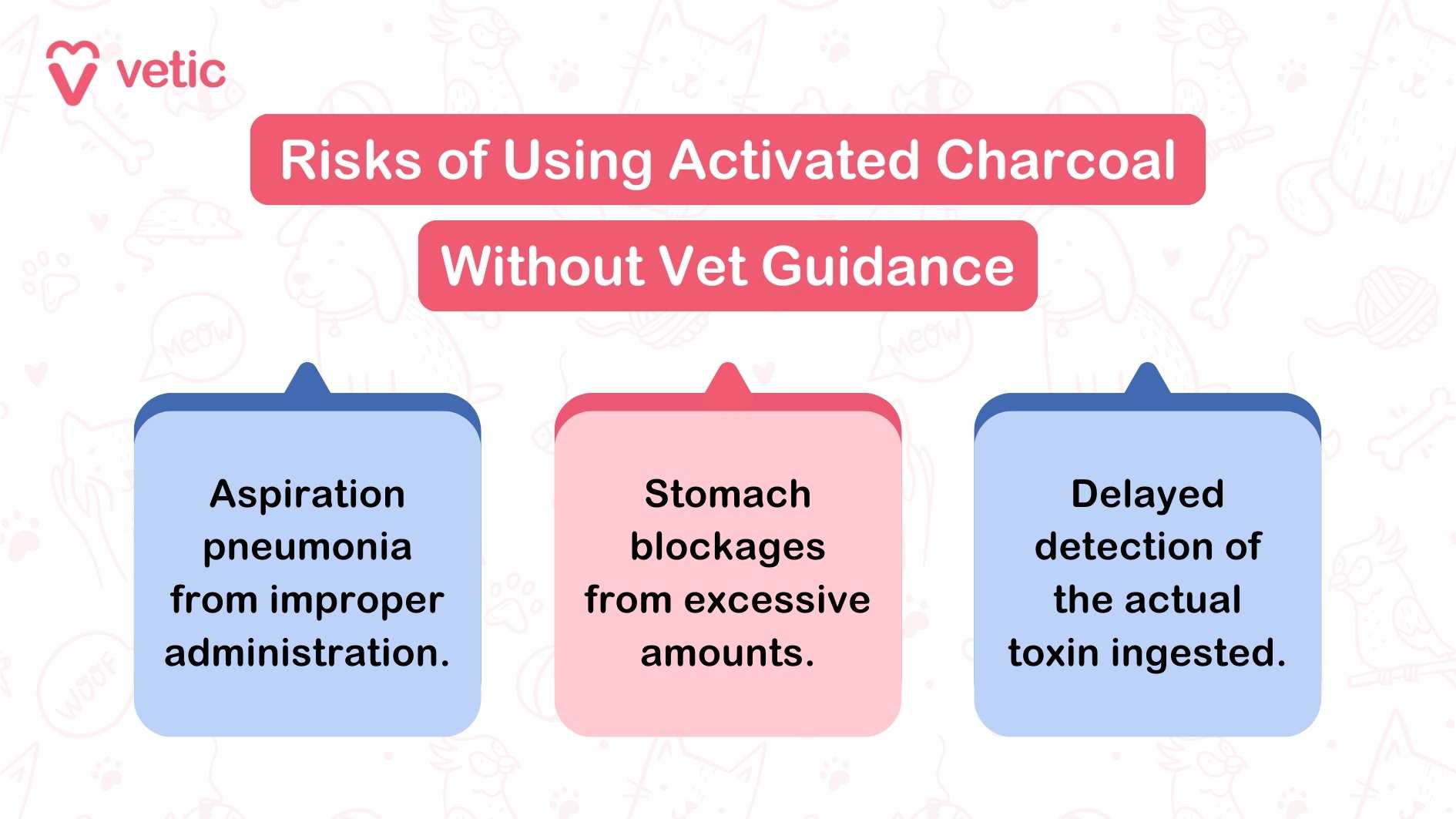
While activated charcoal is generally safe, improper use can lead to severe side effects, including:
Aspiration pneumonia
If your pet is vomiting and you give them activated charcoal, there’s a chance they could accidentally inhale some of it into their lungs instead of swallowing it into their stomach. This can cause a serious lung inflammation called aspiration pneumonia, which can make it hard for your pet to breathe and require emergency treatment.
GI blockages
In rare cases, giving too much activated charcoal at once can create a blockage in your pet’s stomach or intestines. This could stop food and liquids from passing through, causing pain, vomiting, or constipation. This condition might need medical intervention, such as surgery.
Electrolyte imbalances
Activated charcoal can sometimes interfere with the balance of essential minerals (like potassium or sodium) in your pet’s body, especially if multiple doses are given. These minerals are critical for heart, muscle, and nerve function. An imbalance could lead to issues like weakness, irregular heartbeats, or dehydration, which a vet needs to manage carefully.
Missed diagnosis
If you give activated charcoal without consulting a vet, it might make it harder for the vet to figure out what toxin your pet ingested. Activated charcoal can hide symptoms or prevent tests from showing clear results, which delays the correct treatment your pet might need.
By understanding these risks, pet parents can see why it’s essential to use activated charcoal only under veterinary guidance.
When Is Activated Charcoal for Dogs or Cats Not Recommended?
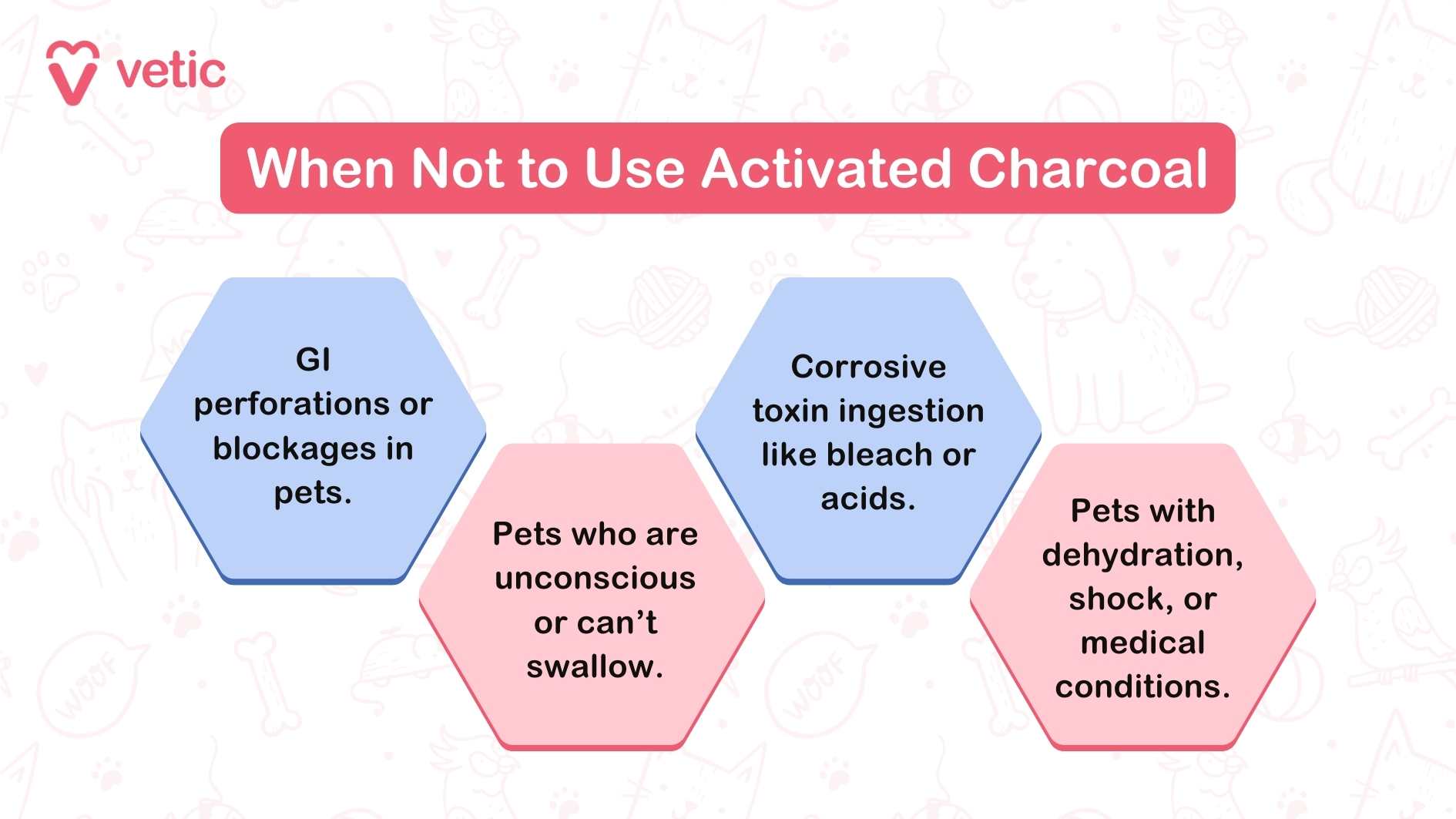
Activated charcoal should never be used in these scenarios:
Pets with GI perforations or obstructions
If your pet has a perforation (a hole) or an obstruction (a blockage) in their stomach or intestines, giving activated charcoal can make things worse. Charcoal can get stuck in the obstruction or leak through the perforation into other parts of the body, causing severe complications that may require surgery.
Unconscious pets or those without a functioning gag reflex
If your pet is unconscious or unable to swallow properly, they might choke or inhale the activated charcoal into their lungs instead of swallowing it into their stomach. This can lead to aspiration pneumonia, a serious lung inflammation that can cause severe breathing difficulties in your pet.
Ingestion of corrosive substances
Activated charcoal does not work on corrosive chemicals like bleach, battery acid, or household cleaners. These substances can burn or severely damage the lining of the stomach and intestines. Charcoal won’t neutralize these toxins and might make it harder for vets to perform other treatments like stomach rinsing.
Specific medical conditions: Like dehydration, shock, or electrolyte imbalances
Pets who are dehydrated, in shock (a life-threatening condition where the organs don’t get enough blood), or have an imbalance of essential minerals like potassium and sodium, are not good candidates for activated charcoal. These conditions can worsen with charcoal treatment and require emergency medical stabilisation before addressing the toxins.
Why Keep Activated Charcoal for Dogs and Cats at Home?
Although it should only be administered under veterinary advice, having activated charcoal at home can be beneficial in emergencies.
If you suspect pet poisoning or toxicity:
- Call your vet immediately.
- Inform them you have activated charcoal available.
- If they ask you to administer a particular amount in powdered form mixed with food, do it.
- Carry it to the clinic for faster treatment.
Quick action can buy precious time and improve outcomes for your pet.
You Shouldn’t Replace Treatment and Antidotes with Activated Charcoal
Activated charcoal can save lives in poisoning emergencies, but it’s not a one-size-fits-all solution. Veterinary supervision is critical to ensuring its safe and effective use.
As a proactive pet parent:
- Keep activated charcoal at home.
- Stay informed about common household toxins.
- Contact your vet immediately in suspected poisoning cases.
Preparedness and quick action can make all the difference for your beloved pet’s health and safety.
Frequently Asked Questions (FAQs)
Can I give activated charcoal to my pet without consulting a vet?
No. Always consult a veterinarian before administering activated charcoal. Incorrect use can harm your pet or worsen their condition.
How soon should activated charcoal be given after poisoning?
It’s most effective within one hour of toxin ingestion, but consult your vet immediately to determine suitability.
Does activated charcoal work for all types of poisoning?
No. It doesn’t work for alcohol, heavy metals, corrosives, or xylitol poisoning. If your pet has come in contact with any of these, head to the veterinary emergency directly.
Are there side effects of activated charcoal for dogs or cats?
Potential side effects include vomiting, constipation, diarrhea, or rarely, aspiration pneumonia. These are less likely under veterinary supervision.
Can activated charcoal for dogs or cats replace other veterinary treatments?
No. It’s a supportive treatment and may need to be combined with induced vomiting, IV fluids, or other therapies.
Should activated charcoal be given to vomiting pets?
No. Vomiting increases the risk of aspiration. Your vet may stabilize the pet first.
Is activated charcoal safe for puppies and kittens?
Puppies and kittens are more prone to dehydration and imbalances, so veterinary supervision is essential.

